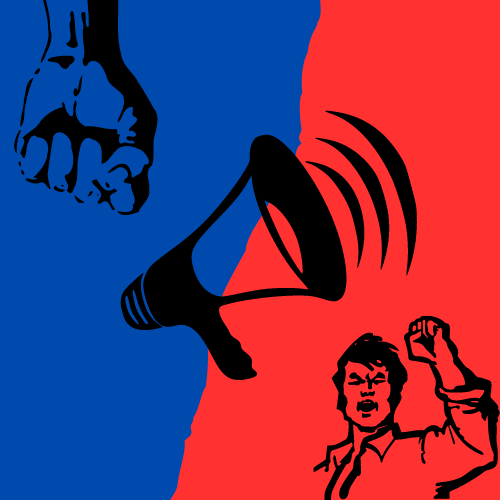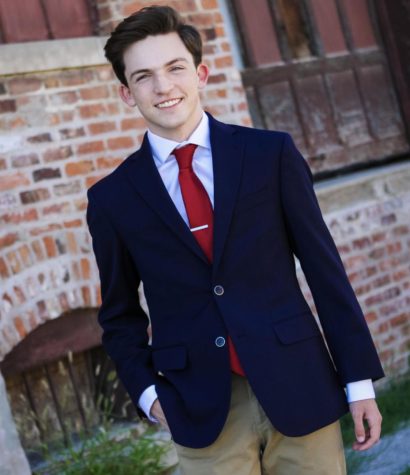High school politics: A social minefield

Politics is always a contentious issue, but when politics and high school mix, issues arise.
Apr 11, 2023
In today’s politically charged society, it seems like everything is up for debate. From the smallest comment to the biggest decisions, politics infiltrates every aspect of our lives. As a high school student, I’ve seen firsthand how this division affects our daily interactions. While most students seem to fall on one side of the political spectrum, the ideological makeup of high schoolers is far more diverse than it may seem. Unfortunately, fear often prevents students from expressing their true beliefs.
In a world where cancel culture and political correctness reign supreme, voicing an unpopular opinion can be social suicide. For many, the safest option is to stay quiet and avoid the conversation altogether. But for me, I’ve never been able to keep my mouth shut, and that has provided me with some of the biggest learning opportunities of my life despite the vapid prejudices that come along with being a conservative in high school.
For many conservative students, they fear the backlash and the labels that will be attached to them: Nazi, bigot, racist, homophobe, and all the -ists and -phobics you can think of. These fears are warranted as through my four years as an outspoken conservative and the president of the Millard South High School Republicans, I’ve heard them all. Most strikingly, I’ve heard them from students that have never even spoken to me. There seems to be a pattern of the less someone knows me, the more likely they are to believe these labels. Frequently, when political topics arise and I give my honest opinion, these students are surprised that I’m not actually a Nazi. However, many of the students who believe these labels will never hear my true beliefs and will continue to view me as such.
Not only do conservative students face social pressures from their peers, but also from positions of authority. While my overall experience within Millard Public Schools has been positive, there have been some instances of political discrimination. Most teachers do an amazing job and are able to hide their political bias, but all conservative students know to be cautious or silent around others who might not share their beliefs.
I have experienced trouble only a few times in my career. Most of the experiences that I can point to are small occurrences that wouldn’t raise many eyebrows, but certainly they were enough to give me a reputation. I admire my social studies teachers for challenging my ideas and making me think about my positions, but this challenge tends to come only towards conservative perspectives. Liberal student opinions are more readily accepted during class discussions. The more egregious instances happen outside of the classroom with teachers who don’t have me in a class. Such as for clubs, the hallway, or any teacher that hears something through the grapevine.
As I have moved through high school, the run-ins that I have had with antagonizing teachers have become increasingly contentious. Reflecting on my high school years, I realize that my political views had a more significant impact on my relationships with teachers than I had anticipated. During freshman year, I was not vocal about my opinions, but as the 2020 election approached, I found myself in more confrontations. However, it was not until my sophomore year, when I ran for student council, that I faced the most significant backlash.
As a part of my campaign for student council, I created a poster modeled after the iconic Obama “Hope” posters. This proved to be controversial in the teacher’s lounge as many of the teachers I was close with began to warn me that the poster might not be well-received. Later, after the campaign, I gifted a poster to one of my favorite teachers. However, this teacher was strong-armed into taking the poster down to avoid further confrontation. Some teachers were upset that I had used an Obama style poster when I clearly was not an ‘Obama fan. This was surprising to me because while I wasn’t an Obama supporter, I certainly wasn’t a die hard Obama hater either. I find it unfortunate that some teachers would be so caught up in political division that they would deem a seemingly innocuous poster dangerous due to the conflicting views of the student and the political figure who used it.
As a result, in my junior and senior years, I learned to be more cautious about expressing my political beliefs to certain teachers. Some educators seemed to hold grudges or biases against students who did not share their political ideology. While I respect the right of teachers to have their own opinions, I think it is unfair and unprofessional to let those opinions affect their treatment of students. High school should be a place where students can learn to think critically, explore diverse perspectives, and develop their own voices, without fear of retaliation.
My experience has not been all doom and gloom though. In fact, I have had numerous positive conversations with teachers and students in and around Millard South, where we have managed to find common ground and understanding. This has taught me a valuable lesson about the real world: not everyone will agree with you. I have also learned how to adapt my thoughts and ideas to different audiences, as well as appreciate diverse perspectives. While some students may not share my views, I have successfully made friends with those who hold opposing viewpoints, which has allowed me to broaden my understanding of the world.


Maddox Nier • Sep 9, 2024 at 11:59 pm
I write for my school’s newspaper and I have to say i’ve been struggling with the bias i’ve been seeing coming from not only the students in that class, but the teacher as well. With a new election coming up, I don’t align with any of my classmates politically, and our Editor-In-Chief is working on a ‘Propaganda Piece’ (word-for-word what the teacher referred it as) and this behavior is encouraged by my teacher, who doesn’t align with my political views either. As a Conservative, I think that our school newspaper should be completely unbiased and we should only be reporting on events that have to do with the school, neighboring schools, international school issues, and worldwide events. My school is writing about the DNC, however hasn’t said anything about the RNC. They’re writing about the upcoming debate with a bias in favor of the left with the debate having not even started. They’re writing a Propaganda Piece for Kamala Harris, whilst bashing Donald Trump when he’s mentioned in conversation, and i would understand if it has anything to do with actual politics but their insults have nothing to do with his political policies. I’m the ‘sports guy’ in my newspaper, but overhearing the student bias, as well as the encouragement of this bias from my teacher has really got me thinking. Also, i come from Florida and the majority of my school is right-leaning with the exception of those running the school newspaper, while I am the only Conservative student in that class. I’m going to publish an article on the subject and thankfully due to my position in the Live TV News production for my school, in the event that my biased Journalism teacher refuses to publish my article in the newspaper, I can get my point across on TV. I wanted to know what you think about this action and how you think I should go about the matter.